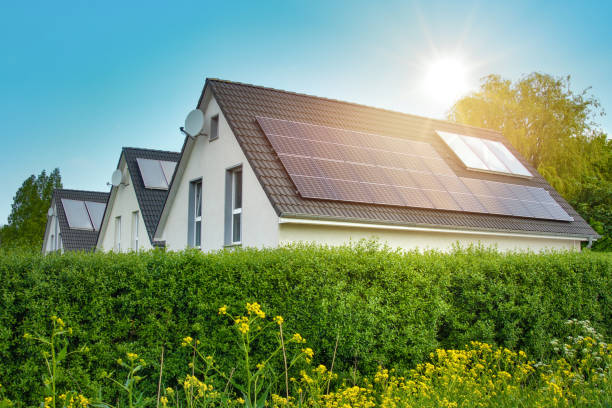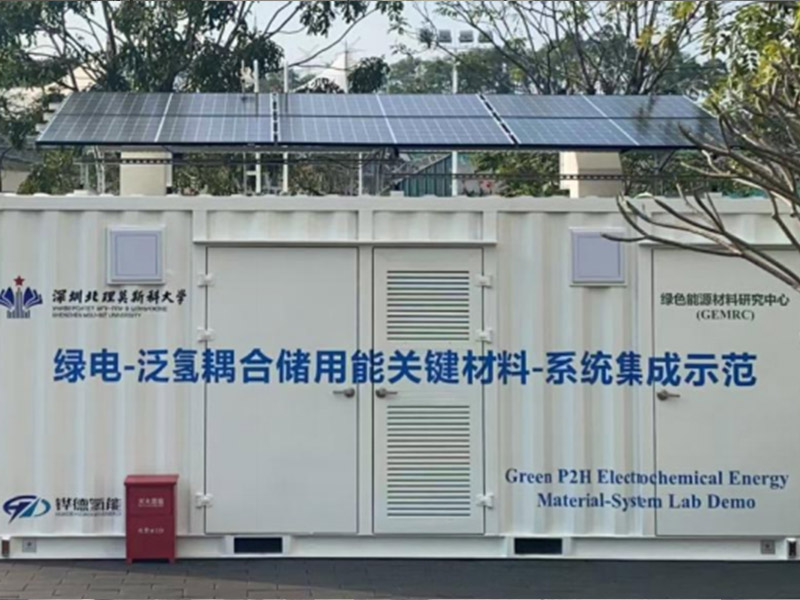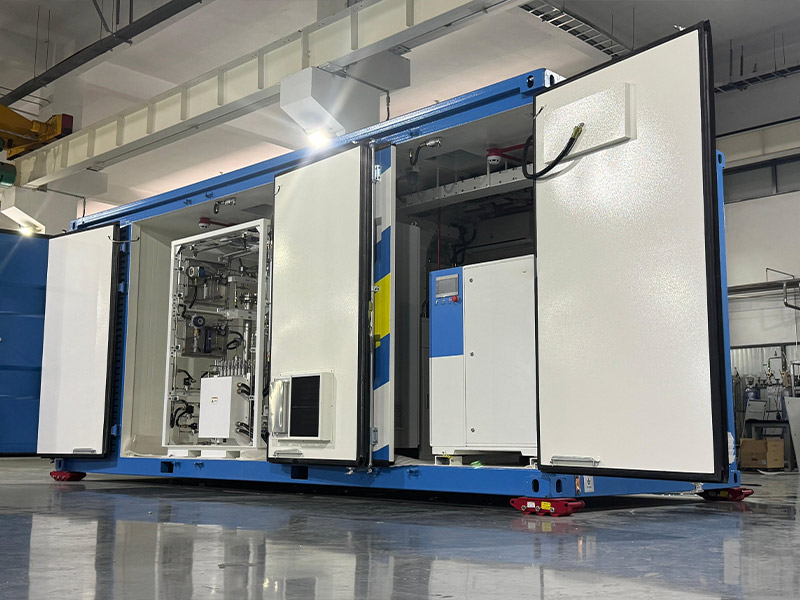Living off the grid is a dream for many—complete energy independence, no utility bills, and freedom from fossil fuels. But relying solely on solar panels and batteries has limitations. Enter solar hydrogen: the missing piece for a truly self-sufficient off-grid lifestyle.
In this guide, we’ll explore how solar hydrogen systems work, why they’re better than batteries alone, and how you can integrate them into your off-grid home.
Keypoints
l Solar hydrogen systems solve the intermittency problem of solar power by storing excess energy as hydrogen for long-term use during cloudy periods or nighttime.
l Hydrogen offers higher energy density than batteries (1kg H₂ ≈ 33kWh) and doesn’t degrade over time, making it ideal for seasonal energy storage.
l A complete off-grid system integrates solar panels, an electrolyzer for hydrogen production, storage tanks, and fuel cells to convert hydrogen back to electricity when needed.
l These systems provide silent, emission-free energy independence—powering homes, vehicles, and appliances with only water as a byproduct.
l While currently more complex than solar+battery setups, solar hydrogen is scalable and future-proof for those seeking 100% self-sufficiency in remote or eco-conscious living.
Solar power is great, but it has two big problems for off-grid living:
Intermittency – No sun at night or during storms means no power.
Limited battery storage – Lithium batteries are expensive and degrade over time.
Hydrogen solves both:
✅ Long-term storage – Store excess solar energy as hydrogen for weeks or months.
✅ Higher energy density – 1 kg of hydrogen = ~33 kWh (vs. ~0.2 kWh/kg for lithium batteries).
✅ No degradation – Unlike batteries, hydrogen tanks don’t lose capacity over time.
Hydrogen storage ensures that even when your solar panels aren’t producing electricity—during cloudy weeks or long winters—you can still have a reliable source of power. This energy resilience is one of the strongest reasons to add hydrogen to your off-grid setup.

As the world moves toward cleaner and more sustainable energy solutions, off-grid solar hydrogen systems are emerging as a powerful alternative for energy independence. These systems combine solar power with hydrogen technology to create a closed-loop solution that generates, stores, and reuses clean energy without relying on the traditional power grid.
Whether you're aiming for a fully self-sufficient home or seeking to reduce your carbon footprint, understanding how these systems work is the first step toward harnessing the power of the sun and hydrogen together. Here's how it all comes together—from solar generation to hydrogen storage and back to electricity when you need it most.
Your rooftop PV system powers your home during the day.
Excess energy goes to an electrolyzer instead of just batteries.
The electrolyzer splits water (H₂O) into hydrogen (H₂) and oxygen (O₂).
Hydrogen is stored, and oxygen is released into the air.
Small PEM or alkaline electrolyzers are ideal for homes (~1–5 kW).
Compressed gas tanks (200–500 bar) are the most common and cost-effective solution.
Metal hydride storage offers safer and denser storage but is currently more expensive.
Underground storage or modular tank systems are options for larger needs.
When solar isn’t enough, the fuel cell powers your home silently and cleanly.
The only byproduct is pure water, which can even be reused in the system.
Traditional off-grid systems rely on battery storage or diesel generators, both of which have limitations. Batteries degrade over time, require frequent replacement, and can be expensive in large systems. Diesel generators, while reliable, create noise and pollution and rely on a steady fuel supply.
✔ True energy independence – No need for diesel generators or external fuel.
✔ Unlimited storage capacity – Ideal for seasonal storage across months.
✔ Silent & clean – No noise, fumes, or pollution.
✔ Multi-use fuel – Hydrogen can power vehicles, cooking appliances, or space heaters.
✔ Scalability – Start small and expand as needed.
✔ Eco-friendly – Hydrogen emits zero greenhouse gases when used in fuel cells.
Solar hydrogen is especially attractive for individuals and families aiming for carbon-neutral or net-zero lifestyles. The off-grid hydrogen technology is becoming more affordable and accessible, making it a forward-looking solution for energy self-sufficiency.
l Remote homesteaders (no grid connection possible)
l Preppers (long-term energy security)
l Eco-conscious families (zero-emission living)
l Ranchers & farmers (powering equipment and irrigation with H₂)
l Tiny home and van lifers (compact hydrogen storage solutions are emerging)
If your goal is to live sustainably and be completely off-grid—even during emergencies or grid outages—solar hydrogen provides unmatched peace of mind.
Audit your energy needs – Calculate how much energy you use daily and monthly to determine hydrogen storage requirements.
Start with solar + batteries – These provide day-to-day power; hydrogen is your long-term buffer.
Choose the right electrolyzer – PEM models offer better efficiency and responsiveness, while alkaline systems are more budget-friendly.
Ensure safety – Hydrogen is flammable but safe with proper ventilation, sensors, and system design.
Monitor & optimize – Use smart controllers and energy management software to balance generation, storage, and consumption.
We’re already seeing promising advancements:
l All-in-one solar-to-hydrogen generators – Compact systems for plug-and-play setups.
l Solar panels with integrated electrolysis – No separate electrolyzer needed.
l Hydrogen appliances – Fuel cell-based stoves, water heaters, and even ATVs.
As technology evolves, off-grid solar hydrogen systems will become even more affordable, compact, and user-friendly. Integration with smart home platforms and IoT controls will also enhance energy efficiency and automation.
For most people today, solar + batteries is still the simplest and most cost-effective off-grid setup.
But if you’re serious about 100% long-term energy independence, solar hydrogen is the future.
Whether you're building a remote cabin, prepping for uncertainty, or just chasing the dream of sustainable living—solar hydrogen can help you get there.
Solar panels power an electrolyzer to split water into hydrogen, which is stored and later converted back to electricity via fuel cells when solar power isn’t available.
Yes, with proper tanks and ventilation. Hydrogen doesn’t degrade like batteries and poses no risk of toxic leaks.
Absolutely! Hydrogen can power fuel cell stoves, heaters, and even vehicles, not just electricity.
Unlike batteries, hydrogen can be stored for months without energy loss—ideal for seasonal use.
Costs are higher than solar+batteries now, but prices are dropping as technology advances. Start small and scale up.
Zero emissions, silent operation, and no need for fuel deliveries—just sunlight and water.
Basic systems are DIY-friendly, but consult experts for safe electrolyzer and tank installation.
Yes! Hydrogen systems perform well in winter, unlike batteries that lose efficiency in the cold.
Minimal upkeep—just monitor tanks, clean solar panels, and ensure proper ventilation.


